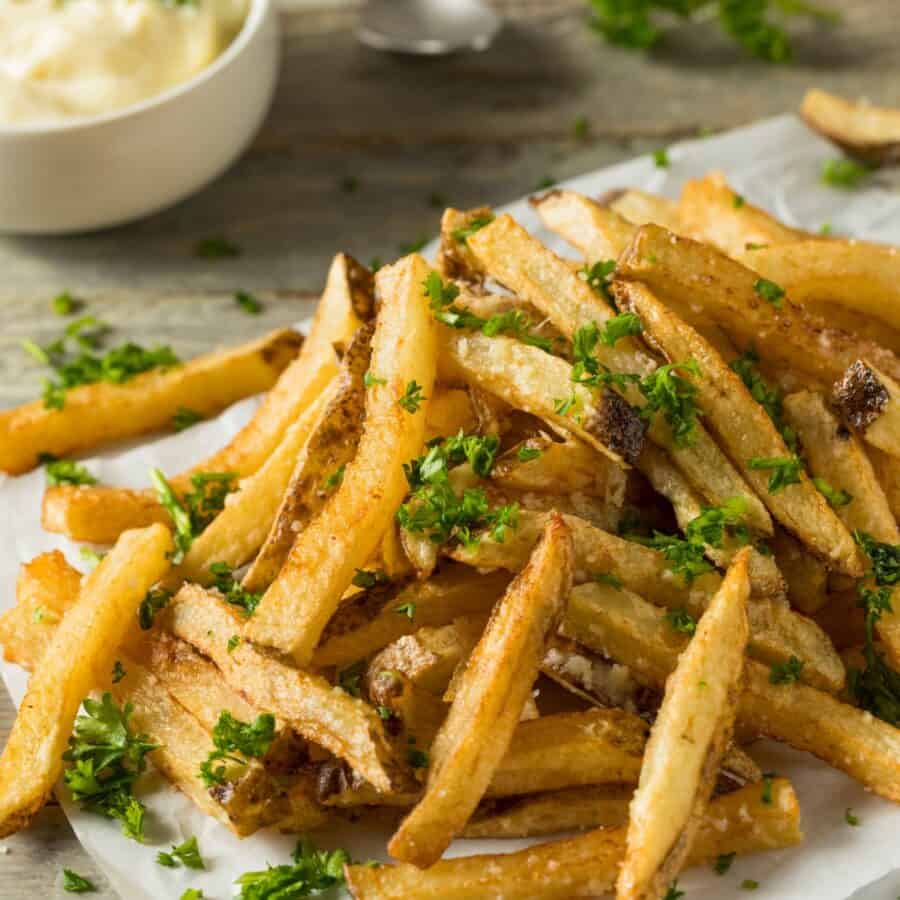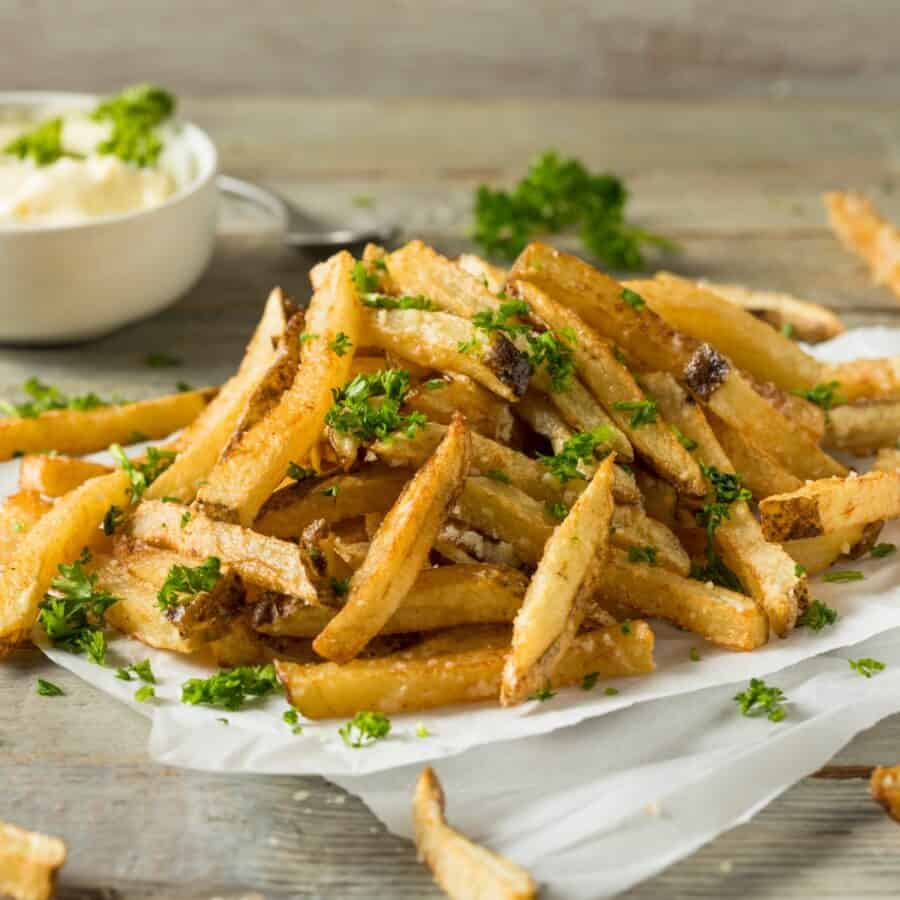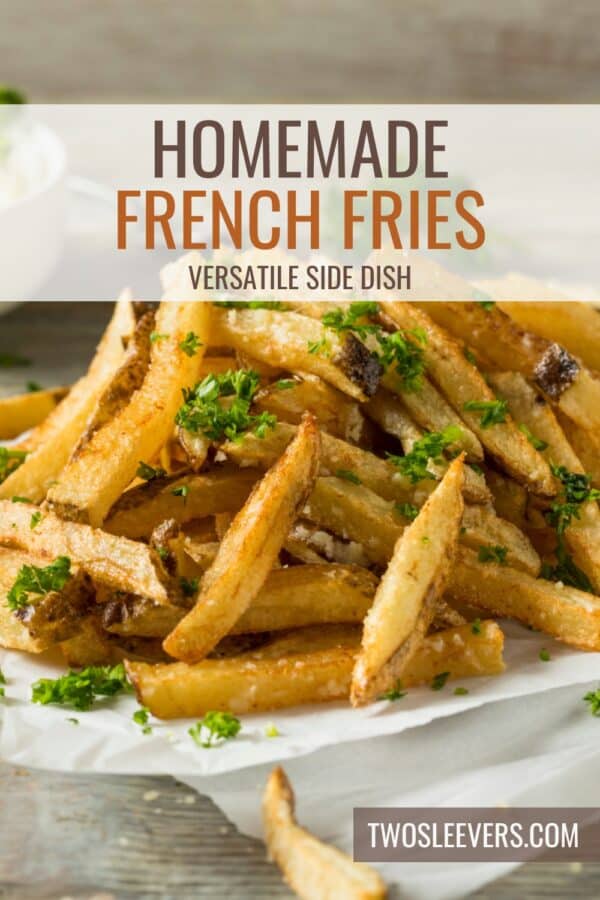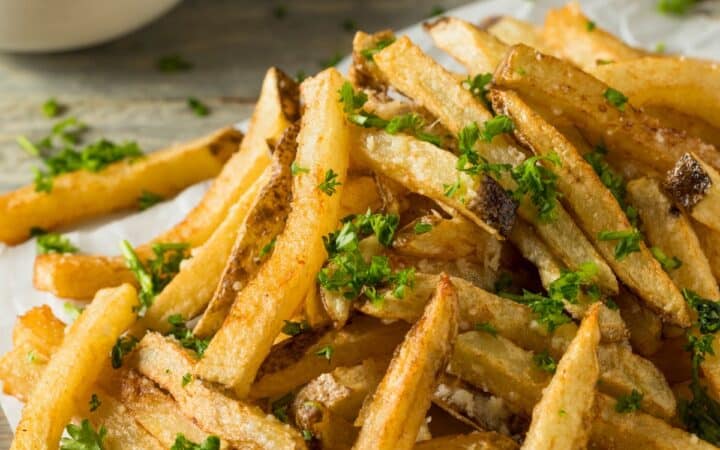Why You’ll Love These Crispy Fries
Fast. Ready in under 30 minutes with simple ingredients. Easy. Prep the potatoes, fry them to golden perfection, and enjoy. Versatile. Season them to your liking for a customized taste experience. Delicious. Packed with flavor that is absolutely finger-licking good.
With the convenience of this recipe, you’ve achieved a restaurant-quality dish that will leave your friends and family craving more. Whether you’re hosting a game day gathering or simply treating yourself to a delicious meal, these fries are guaranteed to be a hit.
Do You Have To Soak Potatoes Before Frying?
Soaking potatoes before frying is not strictly necessary, but it is highly recommended for achieving the best results. Here are the reasons why soaking potatoes before frying can make a big difference:
Removes Excess Starch. Soaking the cut potatoes in cold water helps to remove some of the excess starch. This prevents the fries from becoming too sticky and helps them achieve a crispier texture. Prevents Browning. Excess starch can cause the potatoes to brown too quickly on the outside while remaining undercooked on the inside. Soaking helps to prevent this by allowing for more even cooking. Improves Crispiness. By soaking the potatoes, you can achieve a crispier exterior when frying. The water helps to draw out some of the natural moisture from the potatoes, which is essential for getting that perfect golden crust.
What Is The Best Oil For Homemade French Fries?
The best oil for homemade French fries depends on a few factors such as smoke point, flavor, and health considerations. Here are some of the top choices:
Peanut Oil Pros: High Smoke Point. About 450°F, which is ideal for frying. Flavor. Has a mild flavor that doesn’t overpower the taste of the fries. Cons: Allergies. Not suitable for those with peanut allergies. Canola Oil Pros: High Smoke Point. About 400°F. Healthier Option. Contains lower levels of saturated fats and higher levels of omega-3 fatty acids. Neutral Flavor. Won’t alter the taste of the fries. Cons: Refined. Some may prefer less processed oils. Vegetable Oil Pros: High Smoke Point. Varies, but generally around 400°F. Availability. Widely available and affordable. Cons: Blend of Oils. Can be a mix of different oils, which may not always be the healthiest choice.
Ingredients You’ll Need
Potatoes- Russet potatoes are best for their starchy content, which helps achieve that crispy texture. Olive Oil- Helps crisp up the fries while they’re cooking. Salt- Enhances the flavor of the fries. Optional Seasonings- Garlic powder, onion powder, paprika, or any of your favorite spices.
How To Make Homemade French Fries
Tips And Tricks
Making Homemade French Fries is a delicious endeavor, and a few tips and tricks can help you achieve the best possible results. Here are some pointers to ensure your fries turn out crispy, flavorful, and utterly irresistible:
Soak the Potatoes. Soaking the potato strips in cold water helps remove excess starch and is key to achieving crispy fries. Double Fry. Frying the potatoes twice—first at a lower temperature, then at a higher temperature—ensures they are crispy on the outside and tender on the inside. Season Immediately. Seasoning the fries while they are hot allows the salt and spices to stick better, enhancing the flavor.
Variations
If you’re a fan of Homemade French Fries and want to try some creative variations, here are a few delicious ideas to explore:
Garlic Parmesan Fries- Toss the hot fries in minced garlic and grated Parmesan cheese for a savory twist. Spicy Cajun Fries- Add a blend of Cajun spices to the fries for a spicy kick. Truffle Fries- Drizzle the fries with truffle oil and sprinkle with Parmesan cheese for a gourmet touch.
What To Eat With Homemade French Fries
Homemade French Fries are a versatile dish that pairs well with a variety of sides and accompaniments. Here are some delicious options to consider serving alongside them:
Dipping Sauces- Offer a range of dipping sauces for added variety. Ketchup, aioli, ranch dressing, or spicy mayo complement the flavors of the fries. Burgers- Classic pairing for a satisfying meal. Grilled Chicken- Light and flavorful option that balances the richness of the fries. Salads- Fresh salads provide a refreshing contrast to the crispy fries.
How Long Do They Last?
Cooked Homemade French Fries can be stored in the refrigerator in an airtight container for up to 2 to 3 days. For the best bite, they are best enjoyed fresh, but you can reheat them in an oven or air fryer to regain some of their crispiness.
Can You Freeze Them?
Yes, you can freeze Homemade French Fries to extend their shelf life and enjoy them at a later time. Freezing is a great way to preserve the flavors and texture of the fries.
Freeze Before Frying. After cutting and soaking the potatoes, pat them dry and freeze them on a baking sheet. Once frozen, transfer to a freezer-safe bag. Cook from Frozen. Fry the frozen fries directly in hot oil without thawing. Adjust cooking times as needed.
More Perfect Potato Recipes
Cheesy Potatoes Instant Pot Mashed Potatoes Air Fryer Potatoes Smashed Potatoes Potato Casserole
Pin It!
If you love this recipe for Homemade French Fries as much as we do, make sure you share it with your friends on Facebook and Instgram so they can try it too! Don’t forget to Pin it so you can make it again soon.




